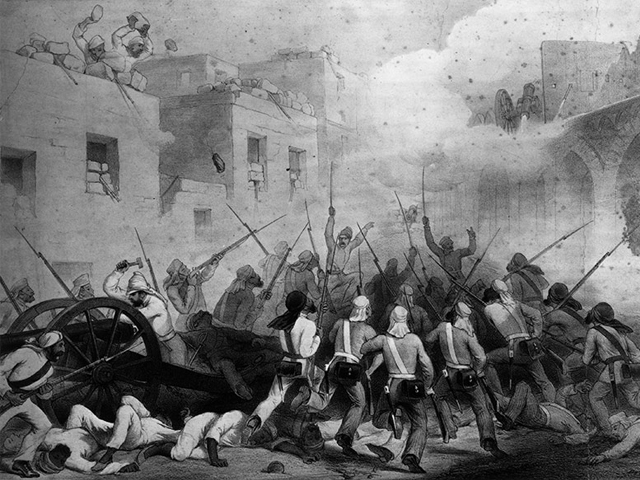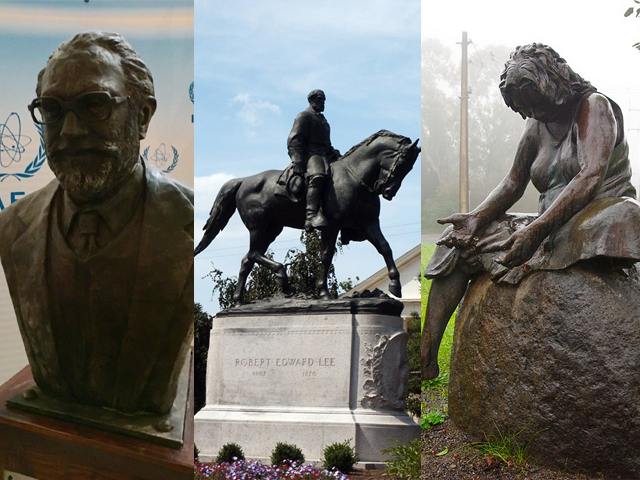
Building the Calais wall will only break bonds
The wall is, therefore, both a dramatic statement of political intent and a conviction that it will work.
The Franco-British Wall of Calais is set to overshadow the Gate of Calais immortalised in William Hogarth’s 1748 painting, the components of which can be seen in Calais today.
The political leadership of the port City of Calais in northern France (population 126,395) believes that a wall extending a fence will effectually control the estimated 7000 plus refugee and migrant overflow concentrated in ‘The Jungle’ on its outskirts.
Calais offers migrants a jumping off point in pursuit of the Great British dream, just a short hop of 33.1 km by tunnel or ferry across the English Channel. Her Majesty’s Home Office has decided to finance the cost of the wall to beef up security in Calais as a way of keeping the problem off “the shores of old Blighty.”
The four meter high, one kilometre long, €2.7 to 3.2 million wall is an extension of the existing steel fences. It is an attempt to prevent migrants from stealing a truck ride into dreamland. There have also been media reports of vehicles attacked by gangs of migrants and some serious trespassing of farmland. Local residents have been uneasy and divided over the presence of migrants so close to their homes.
With next year’s Presidential election looming over France, the centre-right city council of Calais cannot allow itself to be accused of appeasement or inaction. The wall is, therefore, both a dramatic statement of political intent and a conviction that it will work. The history of defensive walls, though, casts doubts on this belief. They are often better at keeping people in, rather than out and, tend to end up haunting their builders.
The wall around Troy (12th century B.C.) was indirectly breached, by a deceptive manoeuvre. The success of the Great Wall of China (14 A.D.) has always been debatable. Much the same can be said of Hadrian’s Wall (128 A.D.) in the UK.
The requirements of modern warfare changed defensive walls into defensive lines with the same dubious results.
The German Hindenburg Line was pierced in World War I at bayonet point. A tad wiser in the Second World War, the Germans just bypassed the French Maginot Line, set up camp in Belgium and, chased the British off the continent.
In 1973, the Egyptians breached the Israeli Bar Lev line and fractured their myth of military invincibility.
The Berlin Wall merely showed up the Soviets, losing them the moral high ground Prime Minister Dame Margaret Thatcher had advised President Ronald Reagan to value more than the actual morality of an act – Mr Donald Trump, please take note.
The under construction Wall of Calais, seeking to contain the migrant crisis, has divided liberals and conservatives within themselves although it has not yet spawned significant realignment. Most of the political opposition to the Wall comes from charities allied with the left and the right. The French liberal and establishment daily Le Monde carried an undercurrent of disapproval in comparing French Foreign Minister Laurent Fabius’ criticism of Hungary’s border fence with the Wall of Calais and the British Daily Mail announced “Theresa trumps Trump …”
On a flying visit to Calais, former President Nicolas Sarkozy, a prospective presidential hopeful, strongly criticised the British for their inaction in the Calais migrant crisis and called for a revision of the 2003 Franco-British accords under which prospective migrants are retained on the French side. He also promised to close down ‘The Jungle’ migrant camp, were he to be president next year. The consummate politician is calculatingly echoing majority sentiment.
Pollster ELABE’s survey for French news channel BFMTV, also carried by Reuters, reveals that 76% of the French support the dismantling of ‘The Jungle’ while 57% of them oppose relocating their occupants across France, or admitting more migrants and refugees.
Thus, opposition to The Wall of Calais is not centered on the end issue but the embarrassment of walling in refugees and migrants.
No political party in a democracy can afford to circumvent public opinion in the pursuit of its ideology, and President François Hollande’s hard-pressed socialist government is no exception.
‘The Jungle’ and the Wall of Calais have made it to the election agenda. But they are only symptomatic of a deeper unease prematurely brought to the surface by leaving a 21st century phenomenon in the closet.
It is regrettable that European countries have to choose between the principles of liberty and their steep price in a stagnant economy targeted by terrorists.
Formalising liberalism as a stand-alone philosophical tradition is generally attributed to the 17th century thinker, John Locke. Finding common ground with humanism, it gained strength by shrinking the Catholic Church’s role in public life while appropriating Christian ideals for secularism. It thrived on the dominant Western prosperity accruing from industrialisation and colonial acquisition. Riding its roller coaster with loud noises, it eventually had to put its money where its mouth was and lead anti-colonial forces, especially in the aftermath of the Second World War.
Decolonisation and the Cold War swung into their tango steps. The Soviets and the West struggled for the souls of the deprived and the dispossessed. The West succeeded and Francis Fukuyama shot to fame by crowing that it was The End of History.
André Malraux, French author and statesperson, preceded Fukuyama in multiple ways when he said,
“The 21st century will be spiritual or will not be.”
And the Wall of Calais fills the comparative hollowness of Fukuyama’s premature victory cry.
In almost thirty years of al Qaeda to present day Daesh and their subsidiaries, religion, the appropriation of its spiritual essence and the resulting fallout have become a battleground of this century. Blame-shifting from the George Bush Duo to the Obama-Hillary combo to Saudi Arabia and Qatar to demographics, youth unemployment and endemic poverty has left the core issue of religion grow in solitude. Consequently, Europe is rapidly blinking in a situation where it either redefines its liberal discourse or else takes it to the bitter end in the teeth of stiff opposition.
The Calais wall is just one tip of this fissuring iceberg.




COMMENTS (2)
Comments are moderated and generally will be posted if they are on-topic and not abusive.
For more information, please see our Comments FAQ